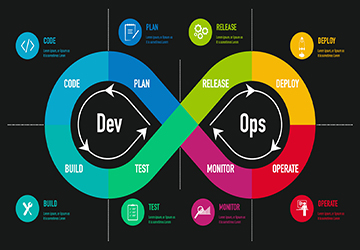The world of software development and IT operations is vast, filled with myriad methodologies and tools designed to streamline processes, enhance collaboration, and improve software delivery speed and quality. DevOps is a cutting-edge practice that merges the traditionally separate domains of software development and information technology operations. This primer is written specifically for newcomers keen to use it professionally or personally. Let's start with a deep dive into DevOps, creating the framework for Starting with DevOps, written with newcomers to DevOps in mind.
An Extensive Overview of DevOps
DevOps's entire breadth and promise can only be appreciated with an in-depth familiarity with its guiding principles. The conventional walls that have separated the development and operations teams are the first thing to be addressed when introducing DevOps. In the past, these groups rarely collaborated, which resulted in wasted time and miscommunication. DevOps aims to close this gap by promoting teamwork, integration, and deployment without stopping.
DevOps is all about better collaboration, faster software release cycles, and fewer bugs, thanks to automated testing and deployments. This holistic method boosts efficiency and ensures the final product is in tune with consumers' wants.

Starting with DevOps: The Initial Steps
Embarking on the DevOps journey requires a structured approach. More than implementing tools and staff is needed to get started with DevOps. It's a cultural shift, one that prioritizes collaboration, transparency, and speed. Here are steps tailored for DevOps for beginners:
● Assess Current Processes: Before integrating any new methodology, it's crucial to understand existing workflows. Identify bottlenecks, redundancies, and areas where communication lapses occur.
● Building a culture of collaboration is essential to the success of DevOps. Foster honest dialogue between the development and operational departments. This culture can be fostered through workshops, team-building exercises, and shared goals.
● Introduce Automation: DevOps heavily emphasizes automation. Integrate tools that automate mundane tasks, such as continuous integration (CI) and continuous delivery (CD). This will ensure consistent, error-free deployments.
● Continuous Learning: The DevOps landscape is ever-evolving. Stay updated with the latest tools, methodologies, and best practices. Workshops, courses, and seminars can be instrumental in this regard.
DevOps for Beginners: Resources and Further Reading
Navigating the world of DevOps, especially when Starting with DevOps, can be overwhelming. Hence, for those venturing into DevOps for beginners, it's advisable to tap into a range of resources:
Books: Numerous DevOps experts have penned down their insights. Books such as "The Phoenix Project" or "The DevOps Handbook" provide comprehensive insights into the DevOps world.
● Online Courses: Coursera, Udemy, and LinkedIn Learning offer courses tailored to different DevOps proficiency levels.
● Communities & Forums: Engaging in DevOps communities can be invaluable. Websites like Stack Overflow, DevOps.com, and Reddit have active DevOps communities where beginners can pose questions, share insights, and learn from seasoned professionals.
Challenges and Considerations in DevOps Adoption
As with any significant shift in methodology, adopting DevOps isn't challenging. An integral part of the DevOps introduction journey involves understanding these challenges to navigate them effectively:
● Resistance to Change: Humans are creatures of habit. Existing teams might resist the merger of Dev and Ops due to fears of redundancy or changes in established workflows. When Starting with DevOps, it's essential to communicate clearly about the benefits and the broader vision to all stakeholders.
● Tool Overload: While tools are instrumental in executing DevOps efficiently, diving headfirst into too many devices can be counterproductive. DevOps for beginners should emphasize understanding the processes first and then identifying which tools align best with their needs.
● Security Concerns: Rapid deployments could sometimes bypass essential security checks. Integrating DevSecOps – a methodology that intertwines security with DevOps practices – can ensure that safety remains paramount without hampering the speed.

Metrics to Measure DevOps Success
The essence of DevOps lies in continuous improvement. But how does one measure the success of their DevOps endeavors? Here are some key metrics that can serve as indicators:
● Deployment Frequency: One of the primary benefits of DevOps is increased deployment speed. Monitoring how often deployments occur can be a direct indicator of efficiency.
● Lead Time for Changes: How long does a new feature take to deployment when it is conceptualized? Reducing this lead time is a testament to the streamlined workflows DevOps promises.
● Change Failure Rate: Rapid deployment doesn't mean much if it leads to frequent failures. A successful DevOps model will have a low rate of failures post-deployment.
● Time to Recovery: If failures occur, how long does it take to revert or fix them? A shorter recovery time suggests a robust and resilient system in place.
Future of DevOps: Where is it Headed?
As technology evolves, so will DevOps. Those Starting with DevOps now will find themselves at the cusp of several exciting advancements:
● Integration with AI and Machine Learning: Automating routine tasks can be taken a step further with AI-driven predictions and interventions, ensuring even more efficient workflows.
● Expansion of DevSecOps: As cyber threats become sophisticated, integrating security protocols within DevOps, rather than as an afterthought, will become standard.
● Infrastructure as Code (IaC): Treating infrastructure setup and configurations as code snippets will further streamline the setup and deployment processes, making it more reproducible and consistent.
The Role of Culture in DevOps Adoption
For organizations Starting with DevOps, fostering a culture of open communication, mutual respect, and shared responsibility is pivotal. Teams should be encouraged to share feedback, celebrate successes, and collectively learn from failures. It's a mindset where blame is replaced with collective accountability, and silos are torn down in favor of collaborative problem-solving. DevOps for beginners should be introduced to an environment where continuous learning and innovation are encouraged and celebrated. This cultural shift might require time and consistent efforts, but it's the bedrock upon which lasting DevOps success is built. In the end, tools and techniques might evolve, but a resilient and adaptable organizational culture ensures that the essence of DevOps remains intact and thrives.
In Conclusion
Integrating DevOps into your organization's culture and workflows is not merely a trendy move; it's an investment in efficiency, quality, and collaborative growth. As you embark on this DevOps introduction, remember that it's not just about tools or technicalities—it's about people, processes, and continuous improvement. Whether you're an individual developer or a large organization, the benefits of Starting with DevOps are manifold. Dive in, foster collaboration, embrace automation, and watch as projects transition from conception to completion with enhanced speed and quality.


